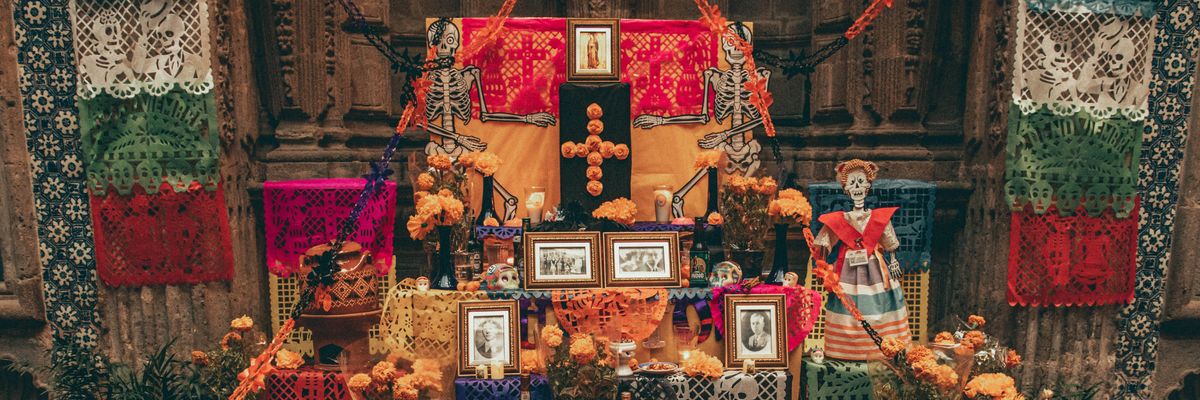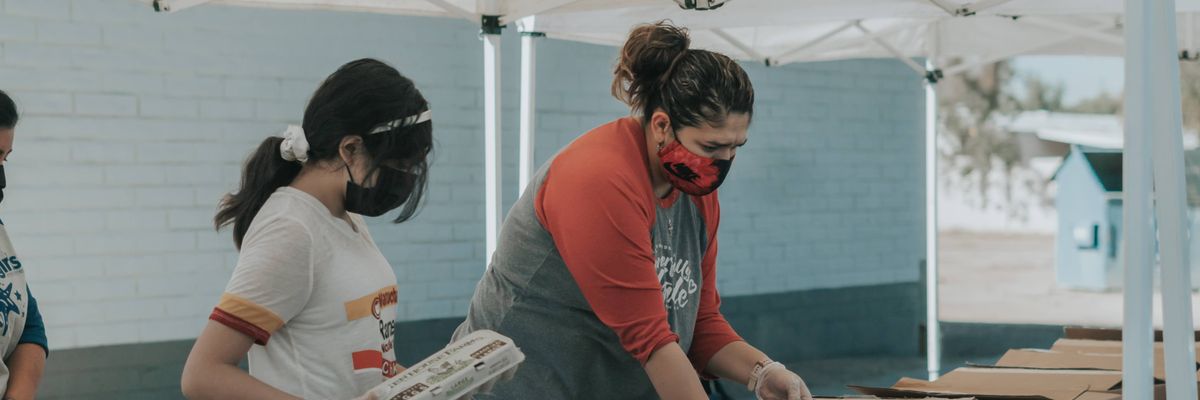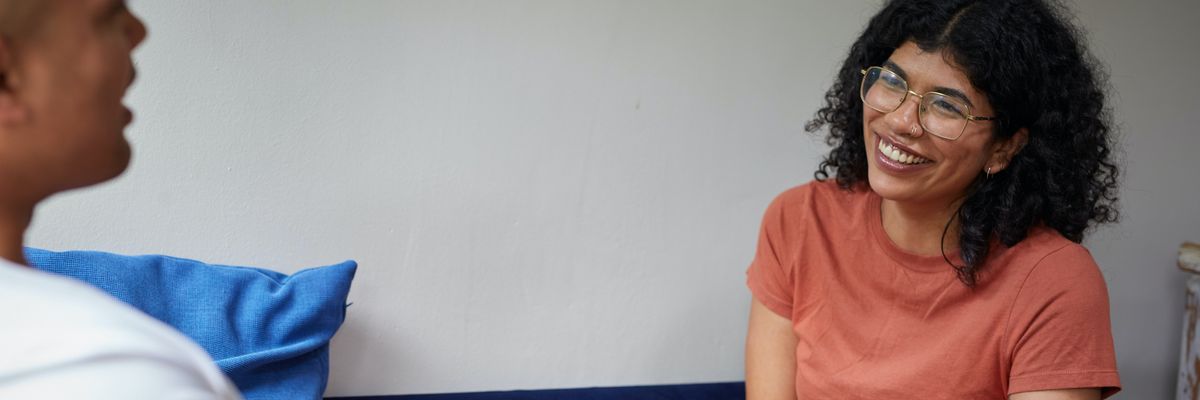Acting with Intent: How Our Daily Choices Can Uplift the Latino Community

Sometimes, we’re so busy with our day to day we forget each of us has the power to weave conscious actions into our routines, reflecting the love and pride we carry for our roots. It's not about large gestures or monumental events; it's in the subtle, daily choices we make and the ways we express ourselves. It's in how we show up for our community and ourselves.
Here are some mindful actions to weave into our daily routine that can create ripples of positive change:
Don't Just Scroll: Celebrate Latine Brilliance

Photo by Antonius Ferret: https://www.pexels.com/photo/women-smiling-while-looking-at-the-smartphone-5253857/
You know that friend who bakes the mouthwatering pan de muerto every fall, or the one lighting up the bar with her singing every week? Don't just be a silent fan. Share their posts on social media! We're always ready to reshare the latest meme, yet often hesitate to boost our friends who are hustling hard and could truly benefit from our support. When we amplify Latine voices, particularly those who may not have a broad platform, we're not just opening doors for them—we're putting a spotlight on the abundant talent within our community.
Speak Spanglish Proudly
 Photo by LinkedIn Sales Solutions on Unsplash
Photo by LinkedIn Sales Solutions on UnsplashWe've all been there—searching for the perfect word in English, only to find that the most fitting term or phrase is en Español. Or maybe you've stumbled upon those moments when the perfect comeback is a blend of both. That's the beauty of Spanglish. It's more than just a hybrid language—it's a testament to our adaptability and the bridge we've built between cultures.
Embracing Spanglish isn’t just about convenience; it’s about celebrating our dual identity, merging our past with our present. And the best part? It gives us a chance to welcome those unfamiliar with Spanish into our rich world of expressions and idioms. Every "estoy full" after a meal or "parquea aquí" when finding a parking spot is a nod to our multifaceted heritage. So, the next time you mix it up, wear your Spanglish with pride. After all, it's a language that captures the essence of who we are—unapologetically multicultural and brilliantly versatile.
Shop Local
 Photo by Robinson Greig on Unsplash
Photo by Robinson Greig on UnsplashHere's a thought: The next time you're on the hunt for adobo, craving authentic handmade tamales, or in search of that standout piece of jewelry, why not turn to a Latino-owned business? Not only are you more likely to find products and services infused with genuine love, culture, and tradition, but every dollar you spend there helps strengthen our economic foothold.
Today, 62.5 million Latinos make up a whopping 19% of the U.S. population. And when it comes to our entrepreneurial spirit, it's unmatched. The nearly 5 million Latino-owned businesses in the U.S. pour a staggering $800 billion into the nation's economy each year, as reported by Congress's Joint Economic Committee. By shopping local and supporting these businesses, you're not just indulging in a personal treat or gift; you're contributing to a larger narrative of Latino success, resilience, and empowerment. Let's continue building our community's legacy, one purchase at a time.Mental Health Check-ins
 Photo by Mauro Lima on Unsplash
Photo by Mauro Lima on UnsplashWithin our community, there's often a stigma around discussing mental health. Every time we gather around the dinner table, celebrate birthdays, or even in those long phone calls catching up with a dear friend, we have opportunities to change this narrative. Instead of sticking to surface-level pleasantries, dare to ask, “How are you really feeling today?” Share your own moments of vulnerability. Talk about that therapy session that made you see things in a new light or that meditation technique you're trying out. The beauty lies in realizing that our mental well-being is just as crucial as our physical health, and discussing it should be as natural as chatting about a recent doctor’s visit.
As we foster an environment where mental health discussions become everyday conversations, we break down age-old barriers. It’s not about having all the answers but creating a safe space for authenticity and support. And when we explore therapy options or share resources, we're not just seeking help but paving a path for others to find their own way to healing. Remember, our community thrives not when we silence our struggles, but when we uplift and support one another through them.
Reconnect with Traditions
 Photo by Roger Ce on Unsplash
Photo by Roger Ce on UnsplashIn the hustle and bustle of our daily lives, it's easy to lose touch with the traditions that shaped us. Setting up an ofrenda for Día de los Muertos isn't just about colorful skulls and candles; it's a profound way to remember and honor those who came before us. Sharing stories of our past, understanding the origins of our customs, or even learning old family recipes, are all ways of honoring our roots.
More importantly, when we involve the younger generations, we're gifting them a legacy, instilling in them pride for where they come from, and ensuring that these traditions will be carried on. So, in between our busy schedules and modern routines, let's take moments to pause and reconnect.
Engage in Community Initiatives
 Photo by Ismael Paramo on Unsplash
Photo by Ismael Paramo on UnsplashJoining or supporting community organizations can be as immersive as facilitating a workshop based on a talent or hobby of yours or as straightforward as volunteering at a local event, helping organize activities that celebrate our shared culture and heritage. Every moment spent engaging with community initiatives creates a ripple effect.
Maybe you have a knack for storytelling. Why not offer to read at a local school or library? Or perhaps you're well-versed in professional skills like resume-building or interview techniques. Consider running a workshop for young adults entering the workforce. Even attending local cultural events helps bolster community spirit, showing organizers and participants alike that their efforts are valued and appreciated. So, the next time you hear about a local event or an opportunity to get involved, take a leap!
Educate & Advocate
 Photo by Sweet Life on Unsplash
Photo by Sweet Life on UnsplashDiscussing the intricacies of immigration reform isn't just a debate topic; for many of us, it's the story of our parents, grandparents, or even our own journey. Advocating for bilingual education is not just about learning two languages; it's about preserving our heritage and ensuring our children are equipped to thrive in a multicultural world. And casting our vote? It's more than a civic duty. It's our voice, our representation, our chance to shape a future that reflects and respects our values.
The political climate is like the weather—unpredictable and ever-changing. Just as we dress appropriately to face the day's forecast, we need to stay informed to navigate these uncertain terrains. It's not only about the national headlines; local policies can shape our neighborhoods, schools, and workplaces. Being informed means delving deeper, seeking out reputable sources, attending community meetings, and asking questions.
And finally, the most essential tip?
Celebrate every win, big or small.
Did your niece just graduate? Did your comadre open up her own salon? Or maybe you perfected that family tres leches recipe? Celebrate! Every milestone, whether it’s in business, education, or personal achievements, uplifts our community. So, next time there's a win, let the cheers ring loud and proud!
- The Unrecognized Influence of Black and Latino Culture on Viral Trends ›
- What's in a Name? Hispanic, Latino, and More Explained ›
- How to start investing - Luz Media ›














